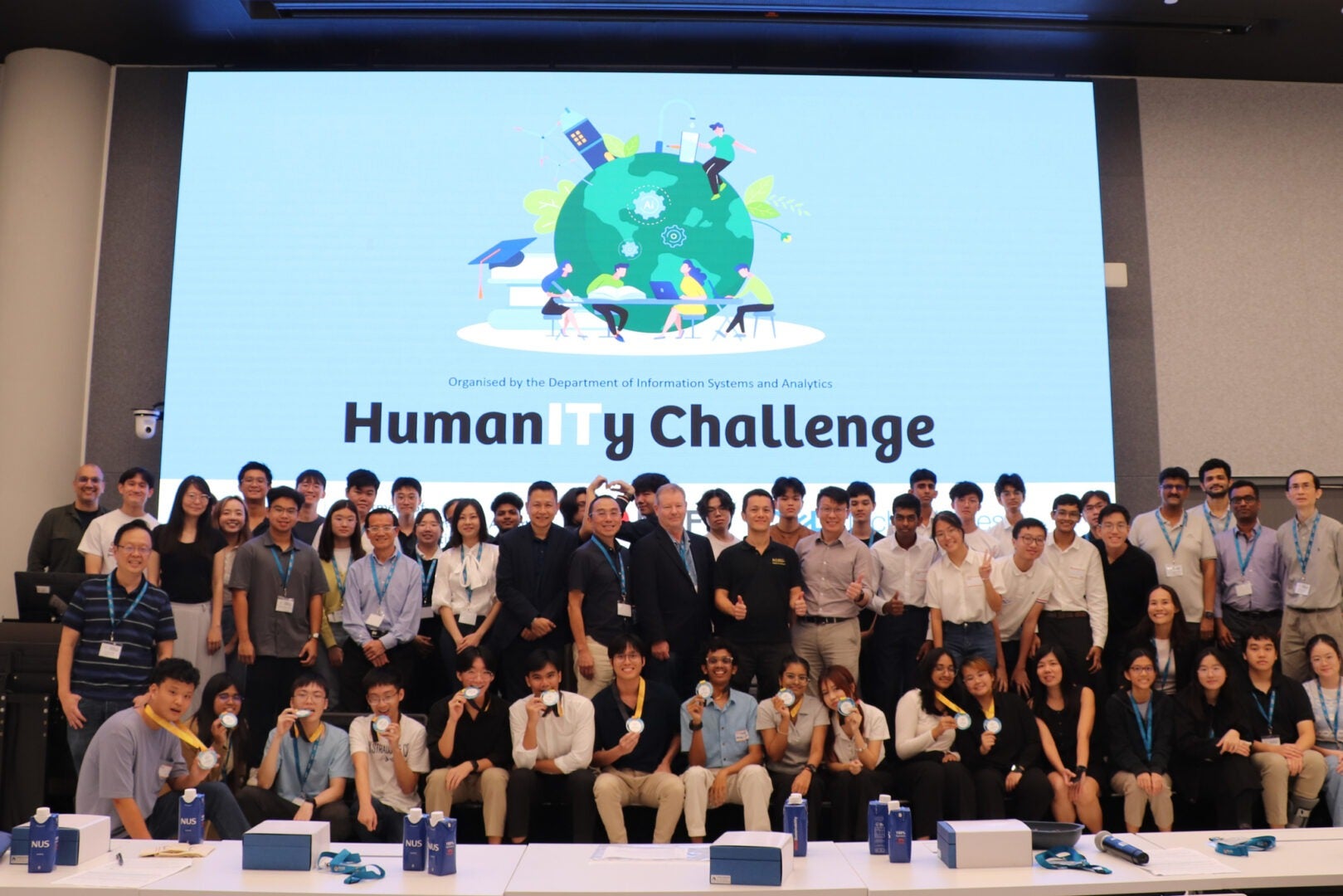Inaugural HumanITy Challenge attracts 168 from 16 schools to advance sustainability efforts

The Department of Information Systems and Analytics at the NUS School of Computing successfully hosted the NUS MUFG DELL HumanITy Challenge from 18 May to 17 August 2024, with the generous support of two platinum sponsors – MUFG Bank and Dell Technologies. The objective of the Challenge is to provide a platform to inspire and develop young talents in designing technology-driven digital innovations to solve real-world sustainability issues for humanity.
Targeting pre-university students from all over Singapore, the Challenge attracted 168 participants in 42 teams from 16 different high schools or junior colleges (i.e., ACS Independent, NUS High, Anderson Serangoon, Anglo-Chinese, Eunoia, Hwa Chong, Nanyang, National, Saint Andrews, Temasek, and Victoria JCs) and polytechnics (i.e., Nanyang, Ngee Ann, Republic, Singapore, and Temasek Polytechnics).
Sustainability is one of the key challenges that humanity faces today. In the Challenge, participants were tasked to identify a pressing sustainability issue within or across different pillars of sustainability (e.g., economic, social, and environmental) and develop a comprehensive and IT-driven innovative solution that addresses the problem. The solution must be sustainable, feasible, scalable, and implementable.
The Challenge kicked off on 18 May 2024 with several academic and industry speakers sharing their knowledge and insights with the participants on the complexity of tackling sustainability issues and encouraging them to think “out of the box” when proposing their sustainability solutions. Several webinars were also conducted to provide the participants with greater exposure to various research and industry initiatives involving technology to address sustainability challenges. Based on the preliminary submissions received, 10 finalist teams were shortlisted to present and showcase their novel ideas, creative problem-solving skills, prototype mobile apps and tech gadgets that leverage the power of technology and digital innovations to tackle society’s pressing sustainability challenges for humanity.
The panel of judges for the finals were Mr. Terence Chia (Assistant Chief Executive, IMDA), who was also the guest of honour, Mr. Tan Bee Teck (Assistant Chief Executive, Admin and Social Cluster and CIO for MOE), Mr. Colin Chen (Head of ESG Finance, MUFG Bank), Mr. Nigel Chng (Director, Dell Technologies Select (Asia Pacific and Japanese Inbound)) and Mr. Richard Wilkins (CEO and Co-founder, Wilkins Technologies). They were most impressed by the finalist teams’ and students’ tech ideas and business proposals that employed the potentials and capabilities of digital technologies such as mobile apps, data analytics, AI/ML solutions and sensors, IoT devices, etc., to tackle sustainability challenges and problems that spanned from e-waste recycling, water conservation, public transport adoption, AI-driven recycling bins, light pollution reduction to ESG investment analysis.
The winning team was “IT Girls” from Temasek Polytechnic, and the winning project was called “H20 Saver”. Their idea was to develop a small smart device that is attached to any tap to measure and control water output precisely. Further, the device learns and predicts the optimal water usage for a task over time.
The runners-up team was “ACEnders” from Anderson Serangoon Junior College with their “E-Waste Sustainability” project. Their idea was to develop a mobile app that can help people locate e-waste bins and to create a reward system to incentivize recycling. They also proposed a novel app feature to call for disposal services to dispose of large appliances.
The third-placed team was “Mickey’s Clubhouse” from Temasek Polytechnic with their submission called “EcoPulse”. With the goal of cutting down CO2 emissions from automobiles, they proposed to encourage people to use public transport by awarding points that can be converted to rewards for every train and bus ride taken. Additionally, they proposed creating sustainability challenges whose completion can be shared with the community to motivate others to take steps towards environmental sustainability.
As a testament to our commitment to sustainability in the HumanITy Challenge, all food and beverages in the final event were sourced from and provided in sustainable sources and utensils from Treatsure and the winners’ medals were made from recycled plastic materials!
